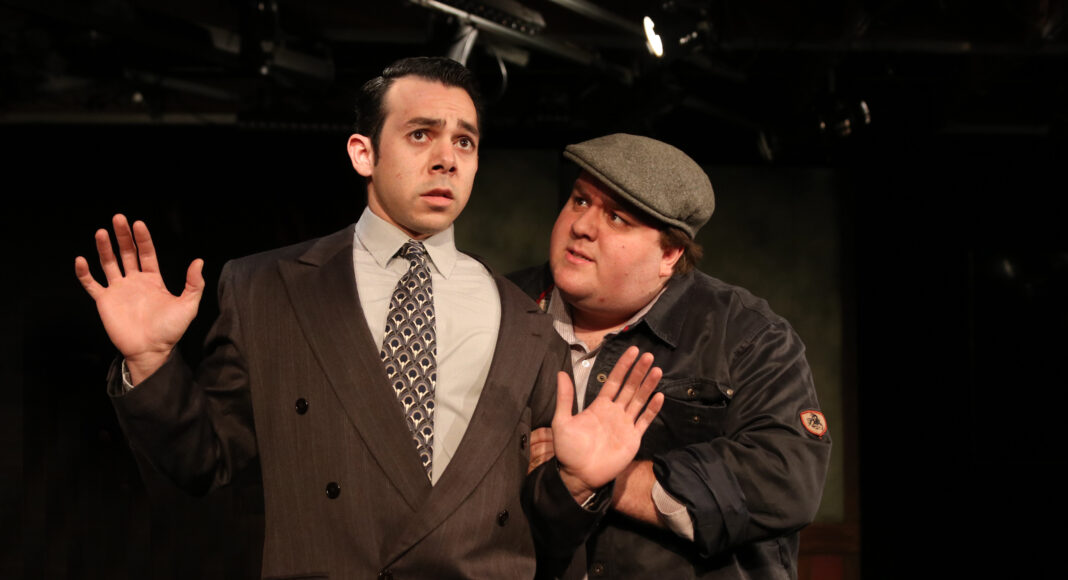San Jose’s St. James Park has seen more than its fair share of violence since the city was founded, its gardens and grasses—meant to provide tranquil escape—also often acting as grounds for death.
During the 1850s, hunters pit bears and bulls against one another in makeshift amphitheaters in the park, attracting hundreds of ticket-holding spectators. In 1875, a man declared a “bandit” was hanged from the park’s scaffolding, spending his last hours in front of an audience perched on nearby rooftops and windowsills. And in 1918, mobsters tarred and feathered a “disloyalist” on the land.
Most shocking of all was the park’s 1933 lynching—a savage finale to an infamous crime, spurred by a mob of vigilantes. Now, audiences can bear witness to the crime and what led up to it only blocks away from the park in a production of the historical drama Swift Justice, at the Tabard Theatre in San Pedro Square.
After the tragic kidnapping and murder of beloved local department store scion Brooke Hart, a mob extradited two jailed suspects from their cells and slung them from nearby tree branches. The affair was met with the jubilation of a carnival—up to 10,000 people gathered—complete with souvenirs of sticks and rope. Translated to today’s population, the lynching would have attracted around 130,000 spectators.
Former San Jose Mayor-turned-playwright Tom McEnery first chronicled this bizarre tale in 2016, inspired by former Mercury News reporter and personal friend Harry Farrell’s book, also titled Swift Justice.
[vimeo]https://vimeo.com/643669198[/vimeo]
“People who’ve lived in San Jose for any number of years, even briefly, have heard something about this,” McEnery said, hours before Friday’s opening performance. “It was then—and still is in a lot of ways now—a small community. We have hundreds of thousands of people who’ve come here over the years, now literally millions of people, but that particular story just seems to capture people’s attention.”
Swift Justice begins with a man named Joseph Karesh, a rabbi who consoled the devastated Hart family and who later became a judge. Within the play’s modern adaptation, Karesh hashes out memories from 1933 alongside commentary of the January 6 insurrection at the U.S. Capital.
McEnery says he hopes the juxtaposition will draw parallels for viewers between the politics and culture of San Jose’s past with its ever changing future.
“It captures, I think, a lot of the fear and uncertainty that people have been going through for the last number of years and in our community as well as in the nation,” McEnery says. “It wasn’t right then and it isn’t right now to set aside the laws and to do what your emotions guide you to do. We’ve seen how these types of things can fail horribly and affect the country now.”
But more than simply a tragedy, McEnery says it’s a history lesson. If it was possible for San Joseans to forge community and prosperity despite mobs and the Great Depression, he says it’s also possible to push through the desperation that’s grown as the pandemic continues to linger.
“Whatever sins we’ve committed as a nation, we’ve never walked away from our real principles,” McEnery says. “There’s always someone out there—whether Martin Luther King or John Lewis —to remind us what the principles of this country mean and why they have to be fought for, even though we may fail in some of the battles as we serve one another.”
Vickie Rozell, the play’s director, says working with McEnery provided a layer of authenticity to the almost unbelievable turn of events, since the former mayor’s personal conversations with surviving family members of the characters contributed to the play’s script. That human element, she says, catapults audience members even deeper into realizing the weight of the lynching.
“Being in the room, it’s a much more intense experience because you can’t put the book down and go away—it is happening in front of you, getting to know these people and seeing what happens to them,” Rozell explains, relating those lessons to what’s at stake in the current political climate. “We cannot give in to these kinds of urges…It’s going to take each one of us to move forward.”
Swift Justice
Through Nov 21, Various Times, $16+
Tabard Theatre, San Jose



